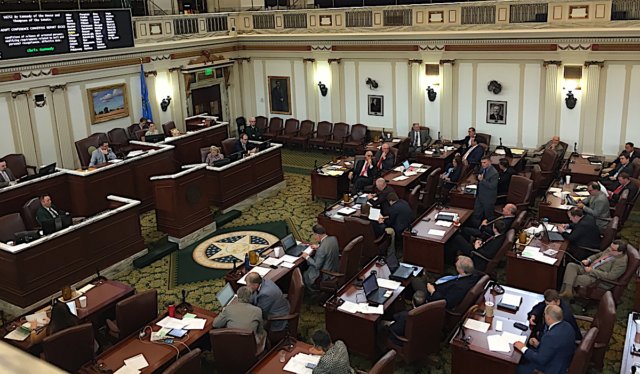

The Oklahoma House of Representatives failed SB 252 this afternoon after days worth of strong lobbying against the bail reform measure by law enforcement professionals and bail bonds companies.
“It’s interesting to me (that) my sheriff is against this bill. My DA is not for this bill,” said Rep. Jim Olsen (R-Roland) during debate against SB 252. “The people who are in this industry say this is a bad idea.”
The final vote, 45-49, underscored the split nature of House members on the proposal.
“I understand mercy, and I understand compassion. But I believe we need, Mr. Speaker, to be cautious in an unwise application of mercy,” Olsen said, shouting into the microphone. “Bail bonds-people provide their services at no cost to the state. And what will be the fiscal impact of this bill? I don’t know that any of us know that.”
Bill author Rep. Chris Kannady (R-OKC) said concerns about unknown financial costs for changing bail rules should not be an impediment for reform.
“We are in dire need of doing something in our system,” Kannady said. “This is not a perfect bill, but our current system is far more flawed than you could ever imagine to the point that we have a crisis.”
A former prosecutor, Rep. Rande Worthen (R-Lawton) said the problems discussed by Kannady and others were predominantly an issue in rural Oklahoma.
“I can tell you, the rest of the 75 counties in Oklahoma are not having the problem that maybe Oklahoma County and Tulsa County have,” Worthen said.
Details of the bail reform measure
Among other changes, SB 252 would specify new guidance and requirements for judges handling the bail-setting process for non-violent offenses. The bill notes:
In setting the amount of bail, the court shall make an individualized determination of what is appropriate for the person. Bail shall not be set in an amount higher than what the court determines is reasonably necessary to ensure the person’s return to court. In setting the amount of bail, the court shall make an individualized determination of what is appropriate for the accused person and shall consider specific factors (…)
The bill lists 11 factors to be considered.
On May 1, Gov. Kevin Stitt discussed the bill with NonDoc.
“I would sign it if it came to my desk,” Stitt said. “But I just don’t think there’s an appetite to push that through because you need to kind of look at that on classifications and sentencing reform altogether on the bail stuff.”
Earlier in this week, Stitt announced a task force to look at those issues.
Answering questions on the measure, Kannady said many of his colleagues voicing concerns about previously convicted people being released should be asking why they were released in the first place.
“I’m well aware that the sheriffs are overwhelmingly opposing this bill,” Kannady said, admitting that the bill would make it more difficult for judges not to set own recognizance (OR) bonds that lack financial strings connecting the accused to the court.
Humphrey: ‘We don’t have the money to set this up’
A series of House members with law enforcement backgrounds — including a former sheriff, a former correctional officer and a former prosecutor — asked questions of and debated against the bill.
“I am for all prison reform. I have no problem with that whatsoever. However this bill is not the one to do it. We have to look back at what our local judges are telling me,” said David Hardin (R-Stilwell). “We had people in New Mexico, Colorado and Texas, down on the Mexican border. They would call me to go get them, and if they don’t have a bond, we don’t have the money to go get them.”
Rep. Justin Humphrey (R-Lane) echoed Hardin and told stories of crime victims that he said should be remembered during any criminal justice reform discussions.
“I brought up several victims, and they just seemed to be swept under the rug. But (I hear) ‘Let’s not talk about them,'” Humphrey said.
Kannady closed debate and pushed back on Humphrey’s concerns.
“My concern here is that this bill and this conversation has taken a turn completely opposite of what this bill does,” Kannady said. “The purpose of this bill is to ensure the constitutional rights of those non-violent, misdemeanor defendants who might sit and rot in jail for days because they can’t afford to get out, and in turn can’t work and can’t support their family.”
Humphrey emphasized his perspective.
“In Oklahoma County, I believe half of the people are already being released on OR bonds,” Humphrey said. “The judges have the discretion. They can do that right now. We don’t have the money to set this up. We are just going to release people who are going to victimize the community.”
Kannady made a procedural motion to capture the vote on SB 252, though it’s unclear if he will be able to gain enough votes on the measure in order to call it back up for a vote Thursday, the expected final day of the session.
“Understand that the purpose of this bill is to take care of those people that we are not taking care of who should not be sitting in county jails day in and day out waiting for their day in court,” Kannady said.
Full text of SB 252’s bail reform language
